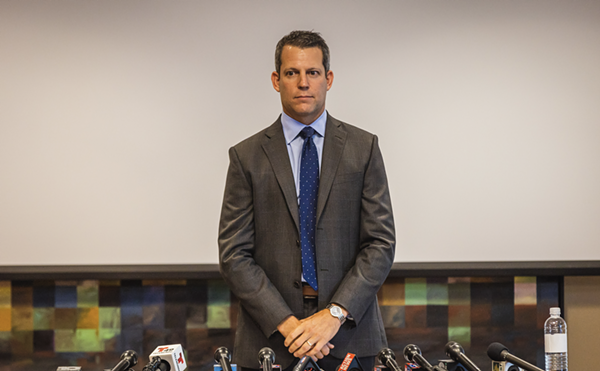What is a space weapon?
China and Russia have joined together to push for a ban on weapons in space.
At the United Nations Conference on Disarmament in Switzerland last week, the foreign ministers of Russia and China said in a joint statement:
"!!!"
I'm as surprised as you are.
The Russians and the Chinese say they're worried that, without a ban, humanity's centuries-long terrestrial arms race will go celestial.
What sort of weapons are the twin red menaces looking to ban? All kinds. You name 'em. Satellites that blow up other satellites? Yup. Satellites that merely cripple other satellites with lasers? Check. Gizmos that hit satellites with a shotgunlike blast of hard objects? Affirmative. Doohickies that shoot stuff at the Earth? Positive. Tie Fighters? Yo! Millennium Falcons. ¡Absolutamente! Illudium Q-36 Explosive Space Modulators. Oui oui!
Don't be mistaken. The Russians and Chinese aren't idealistic hippies waiting for that great day when schools get all the money they need and the air force has to hold a bake sale to buy a bomber.
On the contrary, they're ing their pants at the thought of losing the arms race in space to the United States.
The United States is the undisputed king of all things outer space. The heyday of Russian space exploration was five decades ago when, in a four-year span, they managed to put a metal ball (Sputnik), a stray dog (Laika) and a human (Yuri Gagarin) in space before we could.
Since then, we've been kicking their zero-gravity asses. We put men on the moon. Half the satellites orbiting the Earth are ours. We made the pens that write upside down. We made Tang. Do you hear me? TANG!
The Russians and Chinese aren't just thinking about futuristic, not-yet-invented weapons. They're also thinking about the balance of military power. The pinkos are worried American space-based weapons systems currently being developed will neutralize their nuclear deterrents.
Nuclear deterrence is the notion that, if you have nukes and I have nukes, we would never use them on each other. You nuke my cities with your land-based missiles, then I'll take out your cities with my submarine-based missiles.
Unpleasant, indeed, but the concept is pretty sound. The only time nuclear weapons were used during war was when just one country had them — us.
Since the American atomic bombings of Japan in 1945, the Earth has been gloriously nuclear-warless. This country was so sure mutually assured destruction prevented the use of nukes that, in 1972, we even signed the Anti-Ballistic Missile Treaty with the Godless commie Soviets banning the development of weapons that could be used to destroy incoming nuclear missiles.
In 2002, the Bush administration withdrew from the ABM treaty. As part of its ongoing effort to jeopardize American national security and diplomatic standing in the world for no apparent good reason, the United States said it needed the freedom to develop anti-missile technology to protect the United States from rogue states.
The Russians and the Chinese want the United States to abandon its anti-missile research. The United States is saying, "Thanks, but no thanks," and carrying on. It's worth pointing out China is not yet suggesting it's willing to abandon its work on ground-based anti-satellite rockets. Last year China flexed its muscles by firing a missile into space that destroyed an old Chinese satellite. It was widely interpreted as a warning shot to the United States that its satellites are easy pickins if the two countries ever went to war.
Which brings up an important point. Space is already militarized. Many of the so-called smart weapons the United States uses in Iraq and Afghanistan rely on satellite communication. Planes rely on satellites. Every soldier or Marine with a handheld GPS relies on satellites. Our military dominance is a byproduct of our communications technology dominance. The United States is ahead in the celestial space race, but it also has the most to lose if China and Russia figure out how to catch up.


















